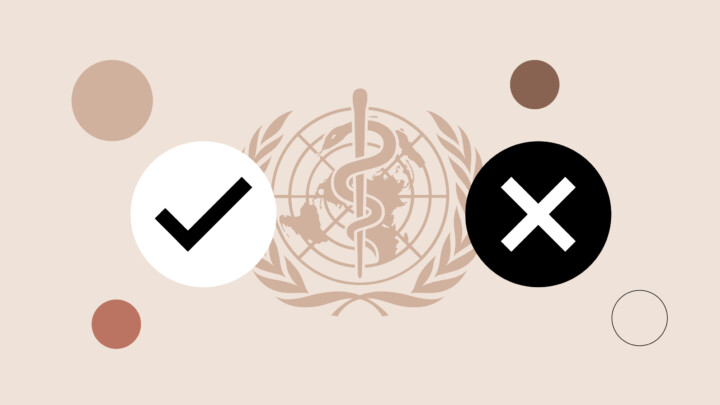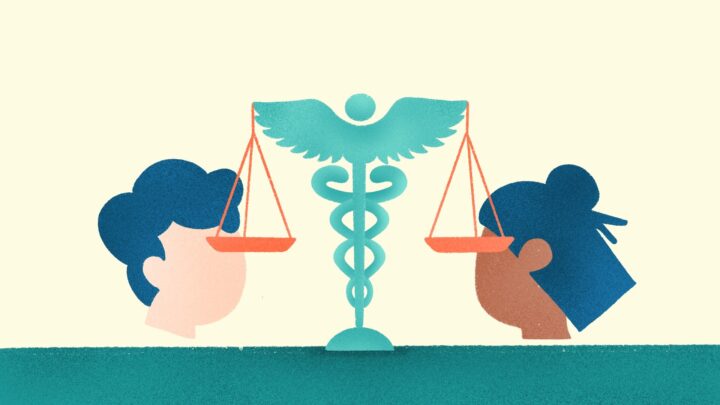
Article Highlights
- Physicians on Sermo report that politics increasingly shapes their practice, from reproductive healthcare laws to Medicare payment cuts, making it critical to stay alert to policy changes that affect both patients and professional sustainability
- Many doctors stress that political agendas often overshadow medical evidence, warning peers to advocate for science-based policy and push back against regulations that compromise patient care
- With 62% of physicians saying politics should not influence medical decisions, members urge colleagues to engage in policy discussions and professional organizations to ensure physicians’ voices lead healthcare debates
Get trusted peer insights, only on Sermo. Join for free today.
Whether you’re a Republican, Democrat, or Independent, it’s impossible to ignore the shadow of politics in our day-to-day lives. From endless news cycles to awkward political debates around the family dinner table, Americans are inundated with political updates. But many physicians are left wondering, “How much does politics really impact healthcare?”
It’s not just about general policy anymore; it’s about how these decisions echo through hospital corridors and clinics. A staggering 44% of Sermo members report they have seen physicians leave their practice due to politics. The 2024 U.S. elections have shown a spotlight on trending healthcare issues, including access to abortion rights. This article explores how politics intertwine with the medical profession to impact physicians, including how political decisions influence patient care, job outlook, and public health policy. We surveyed Sermo physicians to get to the truth and provide a blueprint for how healthcare professionals can best adapt to these changes.
Understanding the impact of politics in healthcare
Healthcare is a critical topic in the 2024 U.S. presidential election. Rising costs of health services, polarization over abortion rights, and shrinking access to quality healthcare have many up in arms over the current system. The choices made now will affect not only the U.S. but also international healthcare dynamics.
For instance, pharmaceutical companies headquartered in the U.S. might face new regulations impacting global markets. Healthcare professionals must stay informed about these developments. Political factors in healthcare often dictate funding allocations, which in turn affect research, drug availability, and overall healthcare quality. Physicians must stay up to date to ensure a positive future for themselves, their family, and their patients.
Do political decisions influence medical practices?

Absolutely. According to our recent Sermo poll, 64% of physicians have experienced changes in their practice due to politics. When political landscapes shift, so do the frameworks within which doctors operate. Political and public health structures are intertwined, with policy changes in healthcare affecting everything from patient care to resource allocation.
For instance, reproductive healthcare legislation can significantly impact medical practices. Anti-abortion laws in states like Texas and Florida force obstetricians to reconsider their practice locations. These laws restrict medical procedures and create environments where healthcare professionals grapple with ethical and legal dilemmas. The pressure extends beyond state lines as physicians nationwide weigh the benefits of remaining in politically charged environments against the potential impacts on their practice and patient care.
Legislative impacts on physicians: Key issues and trends
Legislation is a double-edged sword for healthcare. It can enhance or hinder the ability of physicians to provide care. Also, being on the wrong side of a medical legal battle can result in financial hardship, lost time, a tarnished professional reputation, a revoked license, and even jail time. Current healthcare politics feature heavily divisive issues such as reproductive rights, drug pricing, and gun control. These debates shape the policy landscape physicians must navigate and the reality in which they treat patients.
Take the Medicare Patient Access and Practice Stabilization Act as an example. Introduced in late October 2024, this bipartisan bill aims to prevent a projected 2.8% cut to Medicare physician payments scheduled for January 20251. This would mark the fifth consecutive year of payment cuts for physicians under Medicare, raising concerns about the sustainability of physician practices and access to care.
In California, there is still an ongoing debate on the best way to regulate the high costs of insulin. On October 7, 2023, Governor Gavin Newsom vetoed Senate Bill 90, which sought to cap out-of-pocket insulin costs at $35 per month, expressing concerns that it wouldn’t tackle the root causes of high drug prices2. Instead, he announced the CalRx Initiative, aimed at providing insulin at $30 per vial to all Californians..
Additionally, California has filed a lawsuit against major insulin manufacturers for anti-competitive practices that contribute to inflated prices, highlighting systemic issues in the pharmaceutical pricing structure3. High costs can deter patients from filling prescriptions, ultimately affecting treatment outcomes. If you’re feeling uncertain about the future growth of your practice, see our physician resources here.
The political factors in and public healthcare policy

Public health policy is deeply tied to the political climate. The U.S. elections could bring significant changes to the healthcare system. Poll data reflects varying opinions among physicians regarding the potential impact of presidential candidates on healthcare. Concerns about compensation cuts and increasing legislation are prominent. Pre-election, Sermo found 56% of physicians support Donald Trump, while 31% favor Kamala Harris. That said, both candidates face skepticism regarding their stances on physician compensation and healthcare reform.
Government healthcare policies tend to prioritize budget constraints over healthcare quality, affecting patient care. Physicians must be proactive, advocating for policies that support both their practice’s business growth and patient outcomes. With healthcare legislation evolving rapidly, doctors should engage in policy discussions to ensure their voice is heard.
Read more here on how you can share your experiences to impact healthcare meaningfully.
Navigating political influence in clinical environments
Politics in healthcare affect resource distribution, service regulations, and healthcare access. For example, if a government prioritizes preventive care, it might allocate more resources to vaccination programs or chronic disease management. Conversely, austerity measures could lead to budget cuts, affecting staffing levels and the availability of medical supplies.
For example, many states maintain laws that limit the scope of practice for healthcare professionals, particularly nurse practitioners (NPs) and physician assistants (PAs). There are currently 13 reduced practice states where NPs must collaborate with a physician to provide care4. In comparison, the 11 restricted practice states require ongoing supervision or delegation from a physician.
Political factors affecting healthcare include policy decisions, budget allocations, and legislative changes. These elements determine how resources are distributed and which services are prioritized. Healthcare professionals must stay informed about current events and legislative developments in this context. Understanding these factors allows a physician to anticipate changes and adapt practices accordingly.
Physicians’ perspectives on healthcare politics
Many physicians ask, “Should politicians even be involved in medical decision-making?” Physicians have strong opinions regarding this. 62% of Sermo poll respondents believe politics should not influence medical decisions at all. Many physicians express frustration that non-medical actors dictate healthcare policies. This sentiment is echoed in comments about how political decisions can overshadow clinical expertise, leading to compromised patient care.
Physicians are also concerned about the broader implications of political involvement in healthcare. The potential for increased regulation and oversight can create administrative burdens that detract from patient care. Additionally, political agendas may not always align with scientific evidence, something that became all too obvious during the COVID-19 mask and vaccine mandates.
How politics affect health promotion
Politics can significantly impact health promotion efforts. Government healthcare policies drive public health initiatives. For example, funding for vaccination or anti-smoking programs often hinges on political priorities. When governments prioritize these initiatives, they allocate resources, set targets, and implement strategies to achieve desired health outcomes. Conversely, political shifts can deprioritize certain health issues, reducing funding and support.
Physicians are crucial in promoting public health by advocating for evidence-based policies. By participating in policy discussions, healthcare professionals can influence the development of effective health promotion strategies. Sermo makes it easy for physicians to stay informed about changing policies so they can adapt their practice accordingly.
A Urologist in our community had this to say: “The regional and national politics significantly impact where doctors choose to live and work in our country.”
To see doctors’ trending attitudes concerning politics and healthcare, participate in our live Sermo poll.
If you’re not a member, sign up and click the link to go directly to the poll.
Addressing the challenges of political influence

Navigating politics in healthcare requires a strategic approach. Physicians need to engage in advocacy efforts to influence policy changes. This could involve joining professional organizations that lobby for healthcare reform or participating in public communities, like Sermo, to share expert insights and honest feedback. Together, alongside colleagues, physicians can move medicine forward one conversation at a time on Sermo.
Collaboration among healthcare professionals, policymakers, and stakeholders is also essential. By working together, these groups can address the challenges posed by political influences and develop solutions that benefit patients and healthcare providers alike.
Building resilient healthcare practices
To thrive amid political influence, healthcare professionals must build resilient practices5. This involves adopting flexible treatment approaches, staying informed about policy changes, and promoting continuous team learning. Investing in enhanced health information systems allows for better data management and communication during regulatory changes.
By building resilience, physicians can better adapt to shifting political landscapes and continue providing high-quality care. Healthcare organizations can support providers by offering resources and training that help them understand and respond to political influences. This might include workshops on advocacy, policy updates, and strategies for managing practice changes driven by legislation.
Conclusion

The role of politics in healthcare is undeniable, with significant implications for physicians. By understanding the interconnectedness of politics and healthcare, physicians can better anticipate and respond to changes. Engaging in advocacy, staying informed, and building resilient practices are key strategies for navigating the challenges posed by political influences.
Looking to take your career or practice to the next level? Become a Sermo member to connect, share insights, and discuss the latest developments in healthcare politics. By sharing your unique experiences, you can become the voice that moves medicine forward. For your business, for your patients, and for fellow HCPs worldwide.
Frequently asked questions
Yes, 44% of physicians on Sermo have witnessed colleagues exit their practice due to political pressures surrounding issues like reproductive rights or healthcare regulation.
Absolutely, legislation in states like Texas and Florida has forced obstetricians and midwives to reconsider their practice locations and the scope of care they can provide.
Most physicians say no: 62% believe politics should not interfere with medical judgments or patient care.
Legislative proposals like the Medicare Patient Access and Practice Stabilization Act aim to avert physician payment cuts, highlighting how political advocacy can impact compensation.
Yes. The AMA’s Code of Medical Ethics supports physicians’ political involvement through voting, campaigning, and policy reform, while emphasizing sensitivity and professional boundaries.
Survey methodology
This survey was conducted online to a global sample of physicians across multiple specialties in the Sermo community. Data was collected in November 2024, is self-reported and reflect physician perspectives and experiences. Results are not weighted and should not be interpreted as clinical guidance.















